Chapter 2 - the one where Jill convinced the Chinese authorities to set up a sanctuary
28 August 2015
Read Chapter 1 here
Every time a bear is rescued by Animals Asia we are making a commitment to caring for them for the rest of their lives.
For the majority of the bears we have rescued that means they return with their rescuers to our sanctuaries in either China or Vietnam.
Both are glorious places. It’s easy to take for granted that every time we rescue a bear there’s a ready-made home just waiting for them. Our China Bear Rescue Centre in Chengdu was our first facility and there was a time when that sanctuary was just a distant dream.
How exactly did our founder Jill Robinson begin such a mammoth task of convincing Chinese authorities to allow her to establish a centre where bears are kept purely for their own welfare?
Until that time, bears had largely been seen as a resource to be exploited for financial gain through the extraction and sale of their bile. Indeed, a common misconception was that by keeping bears alive in cages and daily milking their bile, the wild species of bears would be protected because consumers would no longer want the “real thing” in the form of whole gall bladders from wild caught bears. Inevitably this wasn’t to be and bears were illegally poached in the wild to supplement the farms – while the demand for whole gall bladders from wild bears continued.
In 2000, as more attention was paid to the industry, the Chinese government allowed Animals Asia to rescue bears from farms with the worst conditions. However, in order to rescue bears there had to be somewhere to take them. That meant a sanctuary was a must.
But surely trying to convince this nation, with its own unique culture, people and socio-economic infrastructure, was near-impossible?
Not so, according to Jill, who, in the years that followed the inception of Animal Asia, learned quickly that building relationships with the right people were more important than money or sheer bullishness. She said:
“Obviously we’d been wanting to create a sanctuary for some time, and various people knew about our plans, but things really started happening when an understanding government official in Beijing identified an area for us. He suggested we consider Sichuan province because he had what was termed ‘guangxi’ - ‘good connections’ - with members of the forestry department, and he could introduce us to them.
“We were lucky when they generously said we could ‘borrow’ some land in Long Qiao, Chengdu to keep bears in a temporary enclosure, while we looked elsewhere in Sichuan for a more permanent base.”
But while the team continued to work long hours to build their dream, they found out they needed a lot of energy just to survive the overwhelming hospitality of people helping them in China.
Jill continued:
“The negotiations were actually quite fluid - in more ways than one. Our formal introduction taught me a lot about the cultural elements of Chinese relationships - it involved drinking a lot of tea in meetings during the day, and a lot more rice wine - or ‘baiju’ - at dinners in the evenings. As anyone who does business in China knows, this is very routine in the process of collaboration. Thankfully now that I'm older I can wriggle out of the baiju and say I prefer to drink tea at night too. But in the early days, it was just part and parcel of the negotiations and sometimes I wonder how my liver survived.”
So Chengdu it was. And the team there got straight down to business, rescuing 60 bears in just a few months. When it came to negotiations around a site for a permanent centre, the forestry team encouraged Animals Asia to choose a place called Zhiyang, where there were many bear bile farms operating. However, Zhiyang was a long way from the nearest airport and Jill knew this would present all manner of problems. She said:
“It would have been difficult for supporters to get there, and also the media - that was hugely important because we knew we’d need publicity to help us with fundraising. So we asked if we could stay where we were.
“It came as a huge relief when the forestry people in Sichuan province kindly decided to allow us to stay in Chengdu and make the sanctuary permanent. I was over the moon because it’s only 45 minutes from the airport, it’s near to the city and it sits nestled in farmland and forest too. It was beautiful, and perfect for our needs.”
And so, Animals Asia’s first bear rescue centre had found its permanent home. Knowing they were there to stay, the China team set about making improvements to make the bears as comfortable as possible. The agreement between Animals Asia and the authorities remains the same today as back then - the charity pays a fair rent for the 32-acre site each year. The sanctuary is now home to 123 rescued bears.
It’s with immense pride that Jill looks back on those early days, when the organisation was still finding its feet in many ways.
There continued to be challenges. Even the natural elements were an issue because the trees were anything but bear proof. Jill explained:
“Many of the trees in that area are, quite rightly, protected, so we had to take great care creating a sanctuary that was big enough with the right environment for the bears, while removing as few trees as possible. Thankfully a lot of the area is covered in bamboo. It grows very fast and very widespread, like a weed. It’s grown back many times over and we use it to create toys, structures for the bears to play on and even puzzles to keep them challenged as they forage and all sorts of other things.”
Recruiting people was another factor that Jill was determined they got right. After all, to properly care for bears takes more than just building a space for them - they had to consider a multitude of factors relating to bear care.
“We needed to find a skilled bilingual manager for the centre to keep admin and the mountains of paperwork in order, and an entire team of workers to look after the bears. It was hard work and pretty stressful at times, and we took great care to get the right people - several applicants applied for the wrong reasons and some even thought they were helping to run a bear bile farm.”
Other challenges included the sheer amount of bureaucracy involved in such an unprecedented operation. On top of that Jill had to continue working to maintain relationships, building trust with new people in local government as they came and went. That aspect has continued to this day across the whole of the organisation and is fundamental to Animals Asia’s work.
As ever, the unwavering support and encouragement from Jill’s family and friends was immense, and a tide of goodwill helped her steer the Animals Asia ship through many troubled waters:
“John, my ex-husband and still chairman of our board, was hugely supportive and made several trips here despite really basic living conditions. Twelve of us shared a dormitory with one toilet and one shower. I remember little details like freezing cold winters and wearing layers and layers of clothes. There was the biggest huntsman spiders you’ve ever seen at the old hospital. We still get them now but it seemed they used to hide and wait until someone was in the shower to show themselves! You’d have one eye on the soap and the other on the spider, as you raced to finish the fastest wash in the world.”
Week by week, month by month, new friends who wanted to help played their part.
Jill added:
“Even the media were wonderful - one rather lovely Italian journalist used to make a sweep of his hotel before coming to see us every day and bring us all the little bottles of shampoo and conditioner in the bathroom, bags of fruit from the buffet for staff and bears, and even some roses for the vet nurses on Valentine’s Day! The Chinese media were especially kind and enthusiastic. They would be here on site for days – they still often are – wanting us to saturate them with every single detail of rescuing the bears, and telling individual stories of each one. It’s not uncommon to see them cry when we talk about Oliver in a cage for 30 years, or those who have died on arrival from the farms, before they walk out on to grass.”
It was this team spirit, the camaraderie and sense of fellowship, that got the team through the harder days, when all the odds seemed stacked against them.
”In the early days we'd all be pulling together – Chinese and Western staff - it was the only way to get things done. Whether we were preparing for rescues, carrying out health checks, cleaning out rescue cages and dens. I know it’s clichéd but it really was all hands on deck. We all just got on with what had to be done, and that actually formed the template for many of the protocols and job roles that exist to this day. Even though language was sometimes a problem, we could convey a lot just through an understanding developed over the years.
“At no time was this more poignant than when bears arrived from the farms and everyone knew exactly what to do. The earthquake in 2008 was a time where we saw just how brave and determined our whole team could be. So many staff refused to leave the sanctuary despite aftershocks occurring at regular intervals, and in the end we agreed that our Chinese bear workers who were married with families would leave while those who were single would stay. Those who had to leave were devastated because they so wanted to stay and help protect lives, whether people or animals. I’ve never forgotten that time and have so much respect for all those who did stay and who knew they were risking their lives to keep the sanctuary going with a much-reduced staff.”

“One memorable year we asked for gloves to keep the bears’ paws warm during surgery and we were inundated with knitted mittens from supporters across the world – even remote countries and from people who couldn’t afford to send funds, but were happy to knit dozens and dozens of mittens. That’s one of my favourite examples but everyone does what they can.
“It’s only by looking back that I realise quite how far we have come from those early days. Our staff today are incredible, in both the Chengdu sanctuary and the one in Vietnam. Things are more ordered now in terms of who does what but it’s lovely to see there’s still that sense of ‘when its needed, we all muck in.’
“That’s the beauty of Animals Asia - we treat each other with as much respect as we do the bears, which is why I am so proud of it. What has changed is that it isn’t just a small group of people any more. It’s people right across the world.
In truth, we are desperate for donations and people give what they can. Others give their time to volunteer or fund raise. People take pride in telling everyone about the bears and bear bile farming – as well as the work we do. Raising awareness is vital and everyone does something.
“We’ve kept the spirit alive and this is the most important message of all. Everything we do is possible because someone has given their time, money or expertise – very often all three – to the cause. That’s remarkable and it’s why we managed to achieve so much.
“We’ll never stop being grateful for that. Every challenge has been faced and conquered together and with more people helping out we can take on bigger and bigger obstacles. We can be increasingly ambitious as regards what we can achieve.”
BACK

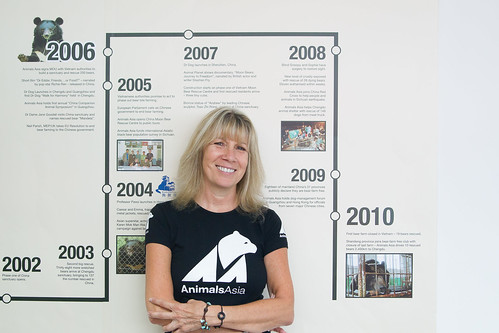
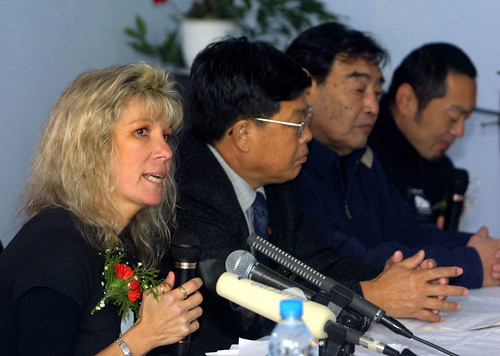
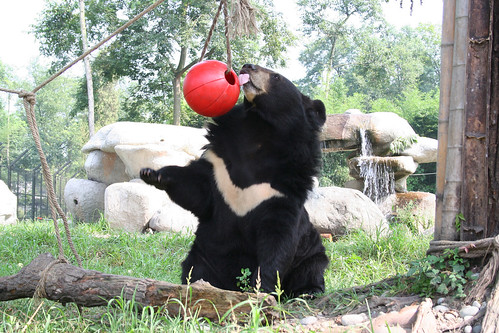
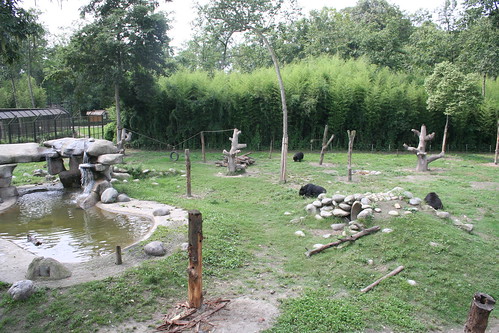
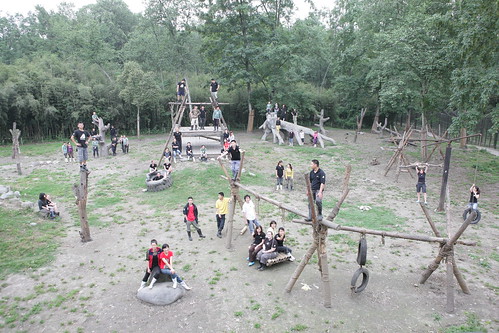
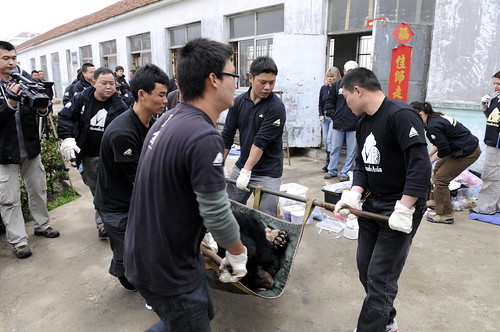





 5 reasons the dog meat trade must end
5 reasons the dog meat trade must end
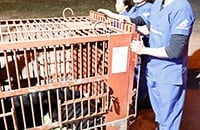 New year, new home for Christmas the Bear!
New year, new home for Christmas the Bear!
 Veterinary welfare training – pain management
Veterinary welfare training – pain management